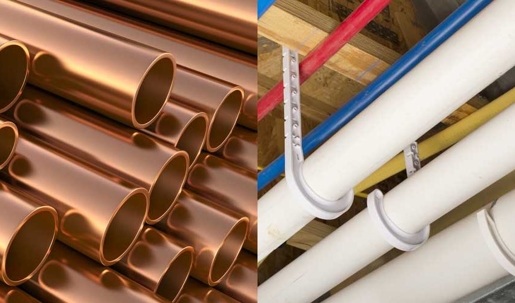Copper Vs Pex – The Home Plumbing Showdown
Copper pipes have been a mainstay in Mesa and Queen Creek residential and commercial plumbing systems for decades. Copper is predictable and many plumbing professionals prefer working with it. However, there is a newcomer in the mix and his name is PEX. An abbreviation for cross-linked polyethylene. It is a type of plastic tubing made from high-density polyethylene.
So which is better? The professional plumbers at Angry Pipe Solutions break down the pros and cons of both below.
Advantages of PEX Pipes
Many will be surprised to know that PEX piping has been around since the ’60s and used in residential applications since the ’80s. However, the last 10 years have seen a much wider adoption of PEX piping.
PEX definitely offers some advantages.
- Flexibility: Pex is much more flexible than copper pipes which can certainly make install in tight or complex areas easier
- No Soldering: Many DIY projects end up with a call to our professional plumbers due to soldering alone. A combination of cheap flux, inadequate heat from your torch, and a lack of experience can create quite the mess when soldering copper pipes. It can also cause leaky joints.
- Freeze Resistant: This may not be a huge benefit to our East Valley customers – however our neighbors to the north can attest to the havoc freezing temps can play on copper pipes
- Resistant to Scale Build Up: PEX is very resistant to scale or “limescale” build-up. Many of the homes our plumbing team visits have hard water. Hard water and copper can cause a build of limescale in your home’s plumbing that requires professional assistance. PEX does not have these issues.
Disadvantages of PEX
It may seem like PEX is the clear winner here – but there are some significant drawbacks to PEX:
- May Leak Chemicals Into your water: California actually banned the use of PEX piping as there were concerns it was leeching chemicals into the water supply. Many independent and national studies on PEX indicate PEX is safe. However, it’s cause for concern.
- Can’t Be Used Outside: PEX is susceptible to UV light and will degrade in the intense Mesa and Queen Creek sun.
- Can Be Damaged by Rodents: Rodents have been known to chew through PEX piping leading to costly leaks
- Easily Damaged by Chemicals: If your water has too high of a chlorine content PEX should be avoided.
Advantages of Copper Pipes
Copper is the main plumbing material you will find in residential and commercial plumbing systems throughout the East Valley. The wide adoption of copper has provided decades of knowledge on how it will perform and what its weaknesses are – pinhole leaks, we’re talking about you. Copper plumbing provides plenty of advantages:
- Proven Durability: Copper pipes can withstand the pressure of up to 1000 PSI and can last for over 70 years.
- Rust Proof: Because copper does not contain any iron, it will not rust. This is a big reason why it’s so widely used in plumbing.
- Non-Toxic: Copper pipes are safe for your home water supply and the environment; there are no harmful chemicals or other compounds. Lead, iron, steel, and even PVC pipes, on the other hand, can release toxins that are linked to major health problems. In addition, copper pipes can be recycled and don’t cause pollution at the end of their lifespan.
- Fire Resistant: A fire in your house is bad enough – but when a small fire causes a massive plumbing leak your problems have multiplied 10 fold. Copper is fire resistant and holds up to high heat much better than PEX.
Disadvantages of Copper Pipes
It should be obvious that plumbers love copper, however, copper is not without its faults:
- Prone to Freeze Damage: Again, not a huge problem here in the East Valley – but it’s worth noting that copper pipes are prone to bursting when exposed to freezing temperatures.
- Corrosion: Copper does not rust, but hard water can cause corrosion and scale build-up. Over time this buildup can lead to blockages and visit from our Angry Pipe Plumbing team.
- Cost: The cost of copper pipes is higher than PEX. This is due to the price of the raw material itself.
- Ridgid: Copper is much more rigid than PEX. To make a 90-degree bend, it requires elbows. The more connection points there are, the higher there is chance for failure in the plumbing system.
Which should you choose?
Our team of plumbers is well versed in the pros and cons of PEX & Copper. Give us a call to discuss your plumbing project and we will help you decide which application is right for you and your home.

